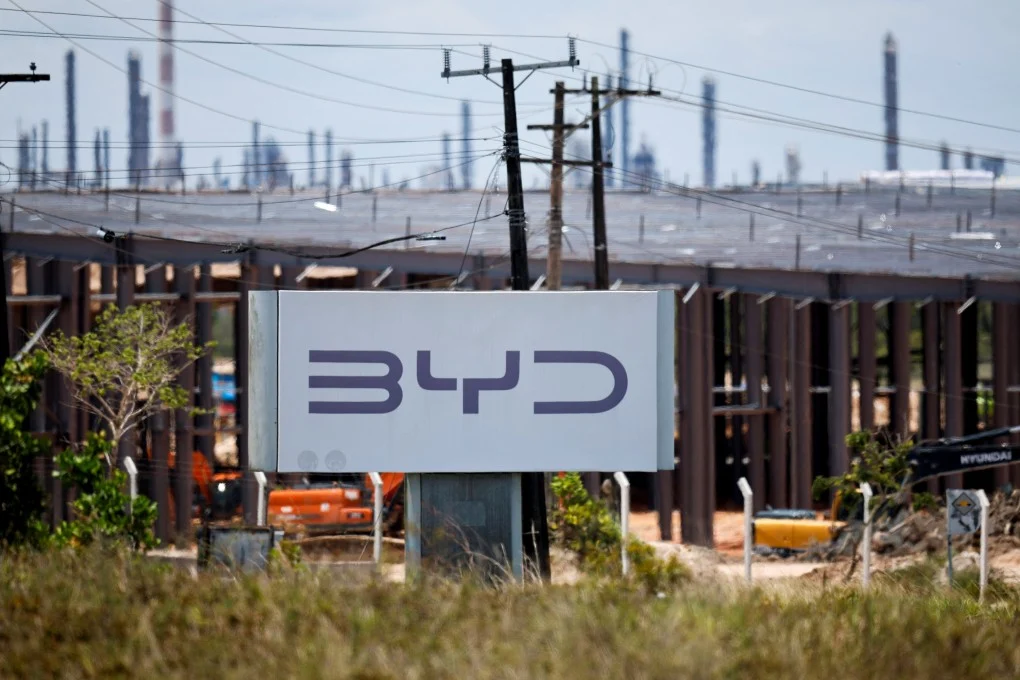In a shocking discovery, 163 Chinese nationals were rescued from what authorities have described as “slavery-like conditions” at a construction site for a factory owned by BYD, a major Chinese electric vehicle (EV) producer, in Bahia state, Brazil.
The workers were subjected to dangerous conditions, excessive working hours, and exploitation, in a case that has raised serious concerns about labor rights and ethical business practices in global supply chains. This incident sheds light on the dark side of global trade and labor exploitation, particularly in emerging industries like electric vehicle manufacturing.
The Discovery: A Glimpse into Modern Slavery
On Monday, Brazilian officials revealed that they had uncovered severe labor abuses at a construction site where Chinese workers were being employed to help build a new factory for BYD in the state of Bahia.
According to the Brazilian labor prosecutor’s office, the workers, all of whom were hired in China, had been brought to Brazil under irregular circumstances. Once in Brazil, they were subjected to “slavery-like conditions,” which included excessive working hours, poor living conditions, and severe restrictions on their freedom.
Reports indicate that the workers were often forced to work seven days a week, exceeding the legal limits for working hours in Brazil. This situation is classified as a form of forced labor, one of the elements of what is referred to as “slavery-like conditions.”
Labor inspector Liane Durao, who was involved in the investigation, noted that the workers were living in degrading conditions, where minimum safety standards were not met, and the workers were exposed to serious risks.
Read : India Has 1.1 Crore People in Forced Slavery: Highest in the World
Furthermore, the workers were reportedly forced to request permission to leave their accommodations, and in an even more disturbing revelation, at least 107 workers had their passports withheld by their employer, further restricting their autonomy.
This case is not only a direct violation of Brazilian labor laws but also raises serious questions about the role of multinational companies in perpetuating such exploitation, especially in sectors like EV manufacturing that are supposed to be forward-thinking and sustainable.
The Nature of Exploitation: Long Hours and Degrading Conditions
The conditions under which these workers were laboring were described as not only unsafe but also degrading to their dignity as human beings. Working long hours under intense pressure, the workers were forced to endure hazardous environments without proper safety equipment or protections.
These conditions are seen as an extension of what is termed “slavery-like,” which includes not just forced labor but debt bondage and other practices that deprive individuals of basic human rights.
Reports from the labor inspectorate reveal that the workers’ living conditions were equally appalling. Many were housed in cramped, substandard accommodations that lacked basic hygiene and safety standards.

The workers, who had been brought from China by an unknown firm and sent to the construction site for BYD’s factory, were restricted from freely coming and going. The withholding of passports is particularly alarming as it indicates a level of control over the workers’ movements, akin to human trafficking, where workers are unable to escape their situation.
In Brazil, the government considers any work that violates human dignity—such as forcing workers to live in unsafe conditions, overworking them, or restricting their freedom of movement—to be “slavery-like conditions.”
By this standard, the conditions that these workers endured on the construction site were far from acceptable. The workers’ plight represents a grave violation of both Brazilian labor law and international human rights standards.
BYD and Global Labor Standards: Implications for the EV Industry
BYD, one of China’s largest and most successful EV manufacturers, has yet to respond to requests for comment regarding the conditions at the construction site. However, the company’s failure to provide an immediate response raises important questions about the responsibility of multinational corporations in overseeing the treatment of workers, especially those in foreign countries.
The Chinese EV maker is one of the leading companies in the global shift toward electric vehicles, a sector hailed for its promise of sustainability and green energy. However, this incident casts a shadow over BYD’s image, highlighting the potential dark side of the global supply chains that support the green revolution.
As demand for electric vehicles increases, so does the need for factory construction, labor, and materials. In the rush to expand operations, there is a real risk of labor abuses going unnoticed or unchecked.

The exploitation of workers at the BYD construction site is particularly concerning because it involves a company at the forefront of a global movement toward cleaner energy. Labor violations such as those found at the construction site could tarnish the credibility of the electric vehicle industry as a whole, which prides itself on environmental sustainability.
This incident raises an important question about how companies in emerging industries can balance the drive for growth and expansion with the responsibility to ensure fair treatment and humane working conditions for all involved in their operations.
It is important to note that the investigation into these abuses is still ongoing, and fines or penalties have not yet been issued. While the Brazilian authorities are working to hold the responsible parties accountable, the lack of immediate answers from BYD highlights the need for greater transparency and more stringent oversight of labor conditions in international supply chains.
The workers who were rescued from the construction site should not be seen as isolated cases, but as part of a larger, systemic issue of labor exploitation within global industries.
The Need for Greater Accountability in Global Supply Chains
The rescue of 163 workers from “slavery-like conditions” at a BYD construction site in Brazil is a stark reminder of the hidden abuses that can occur in global supply chains.
This incident highlights the need for greater transparency, accountability, and ethical practices in industries like electric vehicle manufacturing, which are often hailed as part of the solution to global environmental challenges.

While the focus on sustainability in sectors like electric vehicles is important, it is equally crucial to ensure that these industries do not perpetuate human rights violations in the pursuit of profit. This case calls for an urgent reassessment of labor practices, both in Brazil and globally, to ensure that workers’ rights are protected and respected in all phases of production.
It is imperative that companies like BYD—and other players in the global supply chain—take responsibility for the conditions under which their workers are employed, especially in foreign countries where oversight may be more difficult.
Companies must establish comprehensive policies to ensure that all workers are treated with dignity and respect, and that their rights are safeguarded against exploitation.
As the investigation into this incident continues, it is clear that the exploitation of workers for corporate gain is not something that can be overlooked. This case serves as a wake-up call to the industry, urging a reevaluation of labor practices and a commitment to the ethical treatment of workers across the globe.

